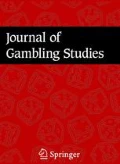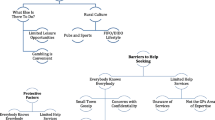Abstract
This study was designed to explore the nature of informal or illegal gambling in South African townships, to investigate what motivates people to participate in this form of gambling and what they perceive are the associated benefits and dis-benefits. A series of focus group workshops was conducted with two groups of gamblers, all of whom had experience of some form of township gambling: one group currently lived in townships and the other had previously resided in townships. Gambling for the township residents was a far more frequent activity than for non-township residents and consumed substantially more of their time. The majority of the township residents classified themselves as unemployed, while of those who were unemployed, most people indicated that gambling was a major source of their income; some even described it as their only source of income. The most significant difference between what township and non-township residents expressed as wanting and getting from gambling was that the former indicated quite clearly and unanimously that what they sought and gained from gambling was money. Township residents were far more likely to indicate that they used gambling to balance their budgets than ex-township residents who gambled primarily at casinos. A lottery type game called “Fahfee” is the most widely spread and pervasive form of gambling and was unanimously portrayed as a necessary and beneficial form of support for the poor and unemployed. Lottery and Casino gambling were, in contrast, widely perceived by the township participants as being ‘rigged’ and unfair. Township Dice and cards were perceived as being ‘fairer’ and as allowing punters to be more in control than casino gambling. The downside of township gambling was reported to be high levels of violence, crime and insecurity surrounding, in particular, the game of Dice. There was widespread inability to calculate expected payoffs or odds, and an apparent belief that these were not particularly helpful skills for gamblers. In Fahfee, the reliance on dreams to guide choice of numbers appears to eradicate any interest in the odds, or of playing strategically. The findings of this study are preliminary but have serious policy implications for education and for gambling regulation in South Africa.
Similar content being viewed by others
Notes
Gauteng is the smallest province of South Africa. It is highly urbanized and is the most populous province, including the cities of Pretoria and Johannesburg.
Gambling South Africa cites that Fahfee has been played in South Africa since 1910 which makes it likely that it came to South Africa with the indentured miners who were brought to the gold mines in the Witwatersrand between 1904 and 1910. However, other authors (Mellet 2010) contend that it was first played in the Western Cape as early as 1870 from where it spread to the rest of the country.
Ufrieda Ho in her autobiographical book “Paper sons and daughters” (Pan Macmillan 2011) writes of her experiences growing up as the daughter of the Fahfee man. She clearly describes how her father used to show the runner the number he had chosen before the purses containing the bets were handed over to him, indicating that the number was chosen by her father but that this number was not influenced by the bets placed by the punters. She does however talk about the responsibility that weighed on her father in thinking up the winning number, and that he took into account the betting patterns of his regulars and that he himself was also influenced by dreams.
“The Limpopo Gambling Board believes that the fifteen major operators in the region alone turn over millions of rands in Fahfee games” http://www.gamblingsa.com/stories/gsa-billion-rand-fahfee-industry-highlighted.html Feb 4 2011, accessed on Jan 6 2012.
A stokvel is an informal savings club where members contribute fixed amounts on a regular basis and get the benefits and security of group savings and rotational credit. Stokvels are a source of credit for people who are often excluded from loans from conventional banks.
References
Collins, P., et al. (2011). Addressing problem gambling: South Africa’s national responsible gambling programme. South African Medical Journal, 101(10), 722–723.
Eden, C., & Ackerman, F. (1998). Making strategy. The journey of strategic management. London: Sage.
Gambling Review Commission Report. (2011). http://www.pmg.org.za/node/28024.
Geldenhuys, K. (2009, February). An ancient game called Fahfee. Servamus: Safety and Security Magazine.
Ho, U. (2011). Paper sons and daughters. Johannesburg: Pan Macmillan.
Krige, D. (2011). We are running for a living. Work, leisure and speculative accumulation in an underground numbers lottery in Johannesburg. African Studies, 70(1), 3–24.
Light, I. (1977). Numbers gambling among blacks: A financial institution. American Sociological Review, 42, 892–904.
Longman, L. (1956). A study of Fahfee. South African Journal of Science, 52, 275–282.
McCree, R. D. (1996). The Chinese game of Whe Whe in Trinidad: From criminalization to criminalization. Caribbean Quarterly, 42(2&3), 1–27.
Mellet, P. (2010). ZINTO: Navigating cape identities—an exploration of identity in South Africa’s Western Cape Province. Saarbrucken: VDN Verlag.
NRGP Gambling Handbook. (2009). http://www.nrgp-gambling-handbook.co.za/documents/NRGP_2009.pdf.
Republic of South Africa (RSA). (1996). The National Gambling Act, No 33 of 1996. http://www.saflii.org/za/legis/num_act/nga1996156/ .
Scott, L., & Barr, G. D. I. (2011). An in-depth enquiry into the reasons people gamble. Report submitted to the NRGP. August 2012.
Acknowledgments
The work contained in this paper was supported by the National Responsible Gambling Programme (NRGP) of South Africa. The authors would, in particular, like to acknowledge the contribution of the CEO of the NRGP, Prof. Peter Collins for his suggestions and comments regarding this paper.
Ethical Clearance
All human studies have been approved by the appropriate ethics committee and have therefore been performed in accordance with the ethical standards laid down in the 1964 Declaration of Helsinki and all persons gave their informed consent prior to their inclusion in this study.
Author information
Authors and Affiliations
Corresponding author
Rights and permissions
About this article
Cite this article
Scott, L., Barr, G. Unregulated Gambling in South African Townships: A Policy Conundrum?. J Gambl Stud 29, 719–732 (2013). https://doi.org/10.1007/s10899-012-9330-0
Published:
Issue Date:
DOI: https://doi.org/10.1007/s10899-012-9330-0



